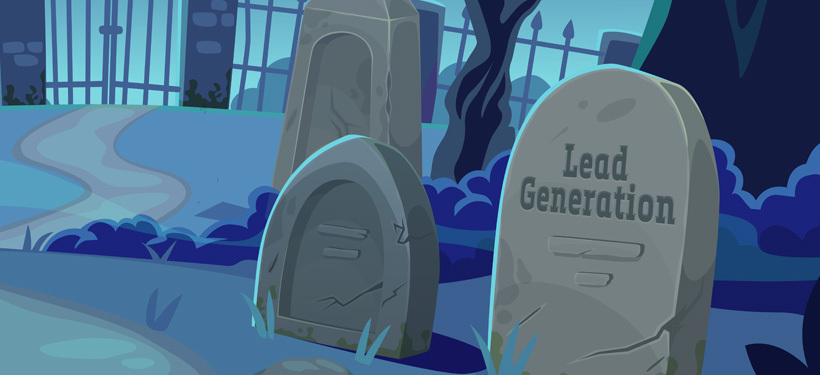The Death of Lead Generation and the Rise of Demand Generation
Lead generation, the coveted alchemy of inbound marketing, is in serious decline as demand generation continues to gain traction in digital marketing.

Lead generation, the coveted alchemy of inbound marketing, is in serious decline as demand generation continues to gain traction in digital marketing. It’s time to accept the truth: lead generation as we know it is dead.
The Fall of Lead Generation
It used to be that lead generation was built on this idea of gated content – provide value-add content in return for contact information. The problem is, that’s no longer as effective as it was. Here’s why.
1. The Form
FatigueThe modern-savvy consumer no longer wants to fill out forms for the privilege of accessing content. He is sick of handing over his information in order to download the latest whitepaper or eBook. When they see a form, a lot of your prospects can exit, stage left. You can have high traffic but horribly low conversion rates.
2. The Sales Call Fear
A lurking anxiety that bombards prospects is the fear that by clicking on submit, they will be deluged with calls from salespeople. And with good reason – that’s been the reality for too long. Instead, higher-priced items such as software remain hidden from view, and only nurturing can slowly demystify and distribute content to an audience.
3. The False Positive Problem
This is important because the hard truth is that just because someone has downloaded your content, they are very likely not a lead. All too often the need to demonstrate campaign results tempts marketing teams into elevating these downloads to victories, and passing ‘leads’ to sales teams that are years away from having any consideration for a purchase decision. This misalignment is not only a terrible use of time and resources, but it can also lead to marketers and sales departments coming into conflict with each other.
The Rise of Demand Generation
Demand generation is about to take the lead as lead generation crops its last daisy. An approach that focuses on adding value, building relationships and which gives prospects the space to self-educate and reach out when they’re ready, it’s what’s going to make the difference to success of marketing in the future: Here are 10 reasons why.
1. Freedom of Information
The core tenet of demand gen is open access information. By removing the gates and letting prospects read your content without restriction, you gradually build trust and establish your brand as a confidant.
2. Respecting the Buyer’s Journey
As a modern-day consumer, I’d much rather look up the information on my own than have to speak to some sales rep whose number one goal is leading me on a charge towards the ledge to close a deal. Demand generation understands that consumers want to take their time to decide on a solution, without feeling the need to agree on the spot.
3. Quality Over Quantity
Though it takes longer for demand generation to yield results, the leads it produces are substantially higher quality. A prospect who comes to you having read your ungated content is often much further along in a buying cycle and more likely to convert.
4. Shorter Sales Cycles
Since leads have already built awareness and educated themselves thanks to your content, the sales process is much easier because eventually they do talk to you – and they already know what you have to offer. They know what your solution does for them, and it’s often easier to close the sale because they are already set to make the decision.
Implementing Demand Generation
Transitioning to a demand generation strategy requires a shift in both mindset and tactics:
Open the Gates: Un-gate your content. Set your whitepapers, eBooks, and webinars free. Believe that if your content is good, prospects will seek it out.
Make SEO and content quality your top priorities: With content available for free, armour up with good SEO to increase the findability of your resources, and push the boundaries of content creation by providing well-researched articles with enough detail that people are willing to acknowledge your authority and pay for your services.
Customize Without Gating: Use gated content for more valuable or specialized pieces, but utilize landing pages as a means to personalize the content experience across other sections of your site to prospects who have shown interest without the need for them to complete a form fill. Surface content recommendations or messaging that closely aligns with this visitor based on behavior or attributes you observe but don’t necessarily need to see them provided explicitly.
Nurture through Value: Rather than lead nurturing sequences, look to consistently offer value in multiple formats – leverage email newsletters, social media, and your blog to remain front-of-mind with the people you want to work with.
Revise Your Success Metrics: Stop measuring success by lead quantity and start using engagement quality. Track how your content is being consumed, who’s returning to it, and how well it’s converting visitors into qualified inbound inquiries.
The Road Ahead
The move from lead gen to demand gen won’t be easy, because it requires patience (it takes longer to reap results); investment (it requires a ton of content creation and distribution); and resistance (teams used to the old ways).
But the benefits are worth the effort: by orienting your marketing around how today’s buyers want to make decisions, you’ll build better relationships, generate higher quality leads, and develop deeper and more sustainable business results.
The death of lead-gen isn’t a cause for mourning, but an evolutionary nudge. Embrace demand-gen, and lead your brand into this new marketing world. Your audience is waiting.
Discover Your Marketing Maturity Level
Click the button below to take the assessment.


